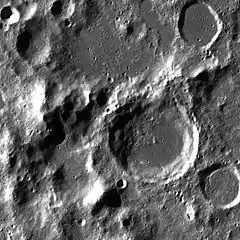 LRO WAC image | |
| Coordinates | 54°12′S 113°30′E / 54.2°S 113.5°E |
|---|---|
| Diameter | 55 km |
| Depth | Unknown |
| Colongitude | 248° at sunrise |
| Eponym | Laurent Cassegrain |
Cassegrain is a lunar impact crater that is located on the far side of the Moon, beyond the southeastern limb. It lies to the southeast of the larger crater Lebedev, and to the northeast of the comparably-sized Priestley. It is named after the inventor of the Cassegrain reflector, who was later identified as most likely Laurent Cassegrain.
The interior of this crater has a relatively dark-hued floor, a feature it has in common with other craters to the west and northwest that form part of the Mare Australe. The floor is level and mostly featureless, except for some deposits in the northwest corner. The rim is more heavily worn in the northwest corner than elsewhere, and the remaining inner wall displays a slumped shelf below the rim.
The crater features prominently in the science fiction novel "The Cassandra Project," by Jack McDevitt and Mike Resnick, Ace Books, New York, 2012.
Satellite craters
By convention these features are identified on lunar maps by placing the letter on the side of the crater midpoint that is closest to Cassegrain.
| Cassegrain | Latitude | Longitude | Diameter |
|---|---|---|---|
| B | 49.0° S | 114.0° E | 39 km |
| H | 53.1° S | 115.6° E | 28 km |
| K | 55.0° S | 113.5° E | 17 km |
References
- Andersson, L. E.; Whitaker, E. A. (1982). NASA Catalogue of Lunar Nomenclature. NASA RP-1097.
- Blue, Jennifer (July 25, 2007). "Gazetteer of Planetary Nomenclature". USGS. Retrieved 2007-08-05.
- Bussey, B.; Spudis, P. (2004). The Clementine Atlas of the Moon. New York: Cambridge University Press. ISBN 978-0-521-81528-4.
- Cocks, Elijah E.; Cocks, Josiah C. (1995). Who's Who on the Moon: A Biographical Dictionary of Lunar Nomenclature. Tudor Publishers. ISBN 978-0-936389-27-1.
- McDowell, Jonathan (July 15, 2007). "Lunar Nomenclature". Jonathan's Space Report. Retrieved 2007-10-24.
- Menzel, D. H.; Minnaert, M.; Levin, B.; Dollfus, A.; Bell, B. (1971). "Report on Lunar Nomenclature by the Working Group of Commission 17 of the IAU". Space Science Reviews. 12 (2): 136–186. Bibcode:1971SSRv...12..136M. doi:10.1007/BF00171763. S2CID 122125855.
- Moore, Patrick (2001). On the Moon. Sterling Publishing Co. ISBN 978-0-304-35469-6.
- Price, Fred W. (1988). The Moon Observer's Handbook. Cambridge University Press. ISBN 978-0-521-33500-3.
- Rükl, Antonín (1990). Atlas of the Moon. Kalmbach Books. ISBN 978-0-913135-17-4.
- Webb, Rev. T. W. (1962). Celestial Objects for Common Telescopes (6th revised ed.). Dover. ISBN 978-0-486-20917-3.
- Whitaker, Ewen A. (1999). Mapping and Naming the Moon. Cambridge University Press. ISBN 978-0-521-62248-6.
- Wlasuk, Peter T. (2000). Observing the Moon. Springer. ISBN 978-1-85233-193-1.
